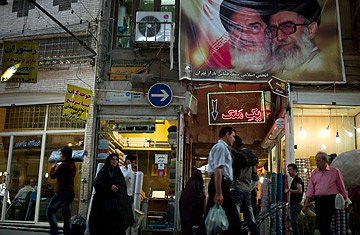
Shoppers in Tehran's Bazaar, while this traditional shopping centre has lost ground to modern day shopping malls, it continues to be the nerve cenrte of Iran's economy. Wholetraders, middlemen and importers all have their offices here, above shops selling rugs, chinese made socks and home appliances.
(3 of 4)
And this is only the beginning. The harshest U.S. and E.U. sanctions just took effect in early July. These include an embargo on Iranian oil by the E.U. and U.S. banking measures that have isolated Iran's financial sector from the global economy. Obama signed a fresh round of sanctions into law in August that have yet to be implemented, and the U.S. Congress is busy mulling yet more sanctions.
Credit no longer exists in Iran; only local debit cards are accepted. Shortages are kicking in. Women beg their friends traveling abroad to bring back Always menstrual pads and Tampax tampons, both of which have disappeared from stores. Many of the brand names gracing supermarket shelves are fakes (Iran doesn't respect international copyrights), so the Adidas T-shirts, Johnson's baby powder and Rolex watches are Chinese or Iranian knockoffs--and bad ones. Tehran used to export fruits and vegetables; now they are kept for local consumption.
Some bigger manufacturers are showing signs of stress, suggesting the sanctions are reducing Iran's industrial capacity. Renault and Peugeot both used to supply carmaker Iran Khodro with parts. They recently suspended shipments. Iran Khodro's production is down 40%, and the company laid off 950 workers in the spring.
If the U.S.-led sanctions are proving painful for housewives and businesses, it's less clear what effect they're having on their intended targets: Iran's leaders and the nuclear program they are committed to defending. Treasury's Cohen says those effects are harder to see. "The purpose of our sanctions program is not to make it difficult to find a green Benetton sweater in the right size," he says. "You're not going to see on the street how hard it is to get steel for centrifuges or high-end electronics for their nuclear program. You're not going to see how hard it is to find sheet aluminum. But the sanctions are having a ripple effect across all these areas."
Meanwhile, trade has been forced into illegal routes, benefiting the Iranian Revolutionary Guards Corps, which runs the nuclear program and is widely believed to facilitate most of the smuggling into Iran. Washington has attempted to cut into the Revolutionary Guards' profits. The U.S. Treasury penalized two Iraqi banks for doing business with Iranian entities.
How long can Iran hold out? A year, maybe two, is the most common refrain from average Iranians. Many believe in Iran's right to nuclear power and even a nuclear weapon. "If Pakistan and India have them, if Israel has them, then why not us?" asks a woman named Dorri. That said, Dorri doesn't think a bomb is worth the sanctions. But like most other Iranians, she plans on doing nothing to protest her government's policy, no matter how bad the economy gets.
Iran's leaders insist their program is purely for energy and medical research, yet they continue to refuse U.N. inspectors access to their sites. The longer the standoff drags on, the more bellicose Israeli rhetoric becomes. Prime Minister Benjamin Netanyahu has been heated about the U.S.'s setting clear "red lines" for action on Tehran's nuclear program. And the IAEA has called on Iran to allow inspectors into a military site at Parchin.
